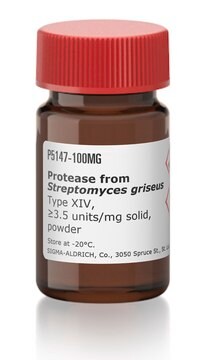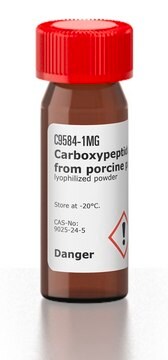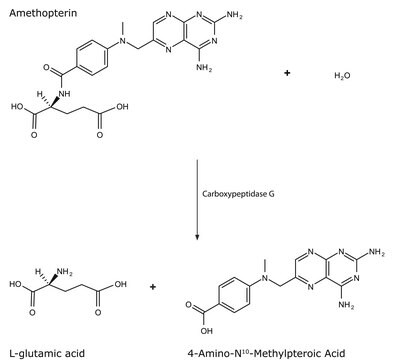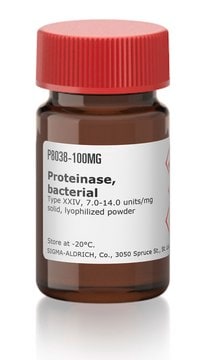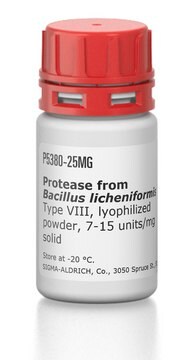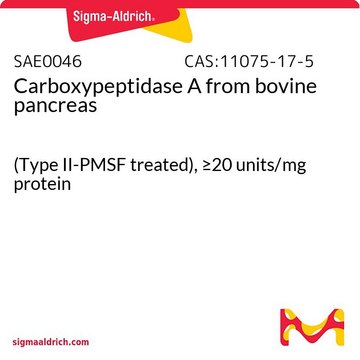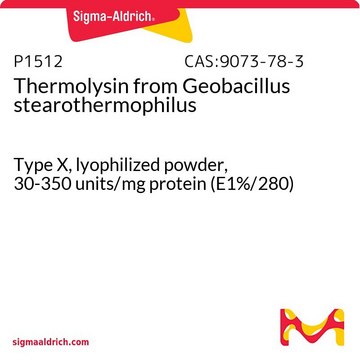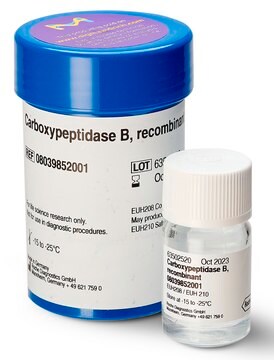C3888
Carboxypeptidase Y from baker′s yeast (S. cerevisiae)
lyophilized powder, ≥50 units/mg protein
Sinônimo(s):
Peptidyl-L-amino acid Hydrolase, Serine Carboxypeptidase
Faça loginpara ver os preços organizacionais e de contrato
About This Item
Número CAS:
Número MDL:
Código UNSPSC:
12352204
NACRES:
NA.54
Produtos recomendados
grau
Proteomics Grade
Formulário
lyophilized powder
atividade específica
≥50 units/mg protein
peso molecular
61 kDa
composição
Protein, ≥75% E1%/280
Condições de expedição
wet ice
temperatura de armazenamento
−20°C
Procurando produtos similares? Visita Guia de comparação de produtos
Categorias relacionadas
Aplicação
Carboxypeptidase Y has a broad specificity and is stable in urea. Hence, this enzyme is not like other carboxypeptidases and can be used for sequence analysis. Due to its amidase action, this enzyme might be applied to the sequence analysis of peptides having amidated COOH-terminal groups such as oxytocin and vasopressin.
Ações bioquímicas/fisiológicas
The glycoprotein has a molecular weight of about 61,000, has a nitrogen content of 12.74%. It is a single polypeptide chain of 442 residues with 16 residues of glucosamine in the carbohydrate moiety. Lysine is at the NH2 terminus and -Asp-Ser-Thr-Leu is the COOH-terminal sequence. The principal action of the enzyme is to remove COOH-terminal residues from polypeptide chains. It is used as a vacuolar marker enzyme for studies on protein transport and localization.
Embalagem
Package size based on protein content
Definição da unidade
One unit will hydrolyze 1.0 μmole of N-CBZ-Phe-Ala to N-CBZ-L-phenylalanine and L-alanine per min at pH 6.75 at 25°C, based on EM/230 = 191.5.
forma física
Lyophilized powder containing citric acid.
Nota de análise
amidase and esterase activities may be present
Palavra indicadora
Danger
Frases de perigo
Declarações de precaução
Classificações de perigo
Eye Irrit. 2 - Resp. Sens. 1 - Skin Irrit. 2 - STOT SE 3
Órgãos-alvo
Respiratory system
Código de classe de armazenamento
11 - Combustible Solids
Classe de risco de água (WGK)
WGK 1
Ponto de fulgor (°F)
Not applicable
Ponto de fulgor (°C)
Not applicable
Escolha uma das versões mais recentes:
Já possui este produto?
Encontre a documentação dos produtos que você adquiriu recentemente na biblioteca de documentos.
Os clientes também visualizaram
Caroline A Magalhães et al.
Memorias do Instituto Oswaldo Cruz, 106(2), 146-152 (2011-05-04)
Typical and atypical enteropathogenic Escherichia coli (EPEC) are considered important bacterial causes of diarrhoea. Considering the repertoire of virulence genes, atypical EPEC (aEPEC) is a heterogeneous group, harbouring genes that are found in other diarrheagenic E. coli pathotypes, such as
H R Stennicke et al.
Biochemistry, 35(22), 7131-7141 (1996-06-04)
The activity of serine carboxypeptidases is dependent on a catalytic triad, an oxyanion hole, and a binding site equivalent to those found in the serine endopeptidases. The action of carboxypeptidase Y on substrates containing amino acids, alcohols, and amines as
L Ballou et al.
Proceedings of the National Academy of Sciences of the United States of America, 87(9), 3368-3372 (1990-05-01)
The N-linked oligosaccharides from baker's yeast carboxypeptidase Y were analyzed by 1H NMR and specific mannosidase digestion and found to be identical to those from the Saccharomyces cerevisiae mnn9 mutant bulk mannoprotein. The results support the view that the mnn
Johanna Rankenberg et al.
Experimental eye research, 210, 108704-108704 (2021-07-25)
Advanced glycation end products (AGEs) accumulate with age in human lens capsules. AGEs in lens capsules potentiate the transforming growth factor beta-2-mediated mesenchymal transition of lens epithelial cells, which suggests that they play a role in posterior capsule opacification after
Václava Bauerová et al.
Canadian journal of microbiology, 58(5), 678-681 (2012-04-17)
Vacuoles play an important role in the physiology of pathogenic Candida spp. However, information on Candida albicans vacuolar enzymes, their properties, and regulation is scarce. Expression of the genes APR1 and CPY1 encoding vacuolar aspartic protease and serine carboxypeptidase, respectively
Nossa equipe de cientistas tem experiência em todas as áreas de pesquisa, incluindo Life Sciences, ciência de materiais, síntese química, cromatografia, química analítica e muitas outras.
Entre em contato com a assistência técnica
